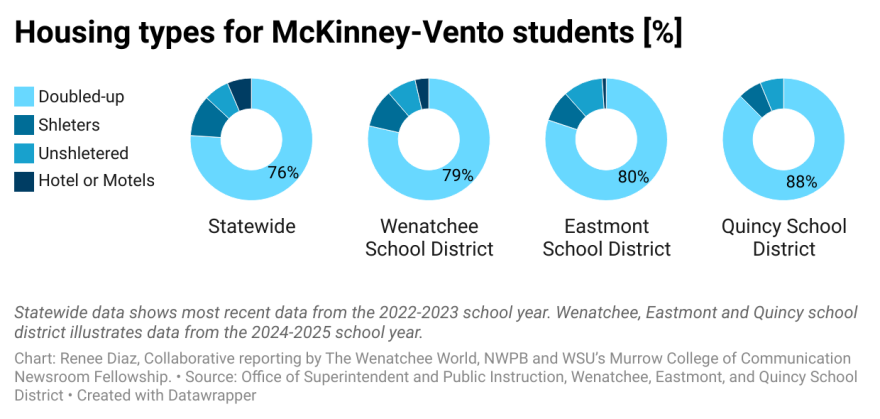More than three-quarters of Washington’s 42,000 homeless students aren’t sleeping outside or in shelters. They're on someone’s couch, staying temporarily with friends, relatives, or acquaintances, often without a room or a bed of their own. It's a situation known as being "doubled-up."
The Washington Office of Superintendent of Public Instruction’s report shows that more than 24,000 students are sharing housing with other people, due to housing loss or financial hardship.
In places like the Eastmont School District, educators say the region’s housing crisis is pushing more students into unstable housing.
“Unaffordable housing is a direct contributor to families living doubled-up,” said Jennifer Robichaux, the assistant principal at Cascade Elementary. She also works with homeless students at Eastmont School District. “The gap between wages and housing costs keeps widening.”
In March, the Trump administration made moves toward closing the U.S. Department of Education. This move could eliminate funding for key programs like the McKinney-Vento Homeless Assistance Act, which provides federal grants to school districts to help identify and support students experiencing homelessness.
“The power of public education is that we serve any student that walks through the door. Cuts of this magnitude is yet one more signal that this administration’s focus has little to do with the reality of student needs,” Chris Reykdal, the state superintendent of public instruction, said in a press release.
In Washington state, over $2 million in federal funding was distributed to school districts in the 2024-2025 school year through the McKinney-Vento Act.
Federal law defines student homelessness as lacking a fixed, regular, and adequate nighttime residence. That includes doubled-up living situations and couch surfing.
Local data reflects the statewide number
In North Central Washington, the numbers mirror the statewide trend. According to McKinney-Vento data for the 2024-2025 school year:
- Wenatchee School District reported 634 homeless students; 498 are doubled-up.
- Eastmont School District reported 220 homeless students; 178 are doubled-up.
- Quincy School District reported 143 homeless students; 112 are doubled-up.
Despite federal recognition, many homeless minors in Washington fall into a legal gray area. The McKinney-Vento Act requires schools to identify and support homeless students with the goal that they stay enrolled and succeed in school.
Rachel Todd, executive director at YWCA North Central Washington, said her organization provides housing assistance for marginalized individuals and families. She said the options are limited for homeless youth in the area.
Licensed overnight youth shelters specifically for minors are limited in the Wenatchee Valley. The closest one for children is about 100 miles away at Rod’s House in Yakima.
“There’s no facility, no beds, unless they’ve been arrested and end up in detention,” Todd said. “That’s not shelter. That’s incarceration.”
While some local agencies offer housing assistance for older youth, the under-18 population remains largely unserved, absorbed into informal couch surfing arrangements that don't offer long-term stability.
Brittany Bouchouari is the director of operations at HopeSource, a group that connects individuals with resources, including housing programs.
“Sometimes being doubled-up is a realistic housing solution for somebody who doesn’t have the ability to generate income. It’s not always unstable housing, but when you get too many people living into one space it becomes uninhabitable and unsafe,” said Bourchouri.
Carmela Solorio Preciado, the McKinney-Vento liaison at the Wenatchee School District, works to meet the basic needs of students experiencing housing instability to ensure they are in safe living situations. She helps students transition from doubled-up housing to more stable, permanent options. During the 2024-2025 school year, she helped 78 students secure permanent housing.
She said there is widespread misunderstanding in the community about who qualifies for help under the act, especially for students who are moving from home to home.
“People think you have to be on the street to be considered homeless,” Preciado said. “But many of our students are couch surfing. They stay wherever they can. Doubled-up housing doesn’t have stability.”
Reneé Diaz may be contacted at [email protected]. Collaborative reporting by The Wenatchee World, NWPB and WSU's Murrow College of Communication Newsroom Fellowship.
Did You Enjoy This Story?
Stay informed with the top stories from NWPB journalists, delivered straight to your inbox every week. Sign up for our weekly news roundup and never miss a headline.
Get NWPB News



